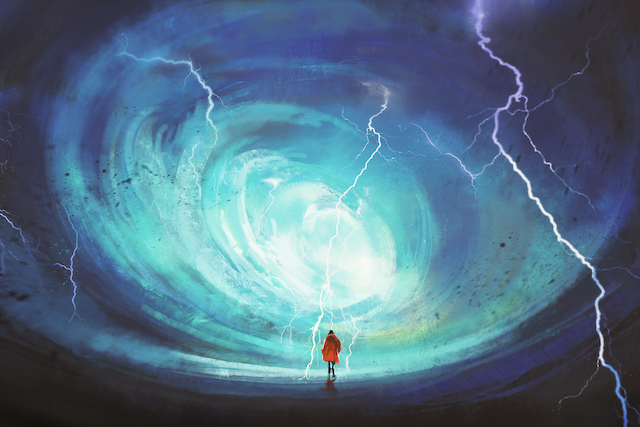
“You can never be happy if you’re trapped in the past and fearful of the future. Living in the present is the only way to be happy.” ~Unknown
Have you found that the local and world events of the last couple of years have taken their toll on you and your family and friends? With fires, floods, shortages of food, fuel, and medicine, illnesses, job losses, and more, all occurring in a short space of time, it can be hard to find anyone who has not been affected in some way.
Many people are experiencing feelings of hopelessness and living in constant fear about the future. And unfortunately, if not managed, over time these feelings can lead to depression, anxiety, and numerous other health conditions.
We’ve all heard that a build-up of stress hormones in our body contributes to illness, but how can we possibly improve our health when we are living in survival mode and feel like the situation is hopeless?
I lived this way for most of my life, wishing I could clone myself a million times so I could get on with changing the world, but feeling sad and frustrated knowing that I could not, no matter how hard I tried.
I was also in my own little bubble of survival, working way too many hours to prove to myself I could be a mum and have a career and save the world, all while my health was deteriorating.
From time to time I found myself thinking, why is it that no matter how hard I try to make things better for myself and my family, something else always comes along and makes everything worse? I was always striving, not even for perfection, but to make things better.
I really wanted a different way, to live a life without the stress, struggle, fear, and health issues.
Fortunately, a friend introduced me to the benefits of guided meditation and how to shift your mindset, and once I understood how powerful these practices could be in helping me to improve my quality of life, I didn’t look back.
Even though it was a struggle for a while, as I made the changes I needed to make—which included restructuring my business, moving three times in twelve months, managing my chronic health issues, and working through the trauma—I have now found a place where I can notice and find joy in the small things, and I have hope for the future.
I learned that, if we can keep a positive outlook and focus on ourselves and how we respond in any situation, we can change how we feel about everything. But how can we do this when we are feeling stuck?
The first thing to realize is that you can’t change others. You can only change yourself and the way that you respond or react.
You can only alter the choices you make in your life and how you can make the world a better place. And the good news is you don’t need to do anything big to do that.
What if you can find small ways to improve:
- Your relationships with family and friends. (For example, by being more present and listening to their interests and needs.)
- Your kindness and care in relating to people you meet. (For example, by questioning your judgements rather than reacting immediately.)
- The way you feel about yourself. (For example, by expressing gratitude for everything you’re doing right.)
What if you can change the way that you look after your environment in your home and community?
What if doing these things has a flow-on effect to everyone else you meet?
What if you say or do something, even a seemingly small thing, that makes others feel more love and joy?
What if they then go on to change something about themselves that gives them more joy and happiness in their lives?
What if each person pays it forward a little more?
We are so much more powerful than we think. Just by changing our perceptions and our actions we have an exponential effect on the people around us.
Did you know that your thoughts and memories are just perceptions of your reality, based on your own life experiences, with some unconscious conditioning thrown in? Every single person in this world experiences life in a different way based on their past, as well as patterns of behavior that developed from a need to feel loved, nurtured, or a sense of belonging as a young child.
Studies have even shown that people who witness an event, e.g., a crime, will always have a different interpretation of what happened compared with anyone else, because we all have our own biases. Often, our memories, when compared with actual video footage of the crime, will be completely inaccurate.
How does this relate to you and lowering your stress and anxiety?
It means that in any given moment you can choose how to perceive the events going in your life, in the community, and world around you.
You can choose to wallow in fear and frustration about things that are outside of your control, or you can choose to empower yourself by focusing on the good and all the things within your control. Like the things that make you feel better. Because when you feel better, you do better, for everyone and everything around you.
Ask yourself, what do I need to do to feel more joy and happiness and hope?
Be consciously aware of your thoughts and notice what comes to you. What do you want to keep and what does not serve your own happiness and joy?
For me, I decided to stop spending as much time looking at news feeds and social media. Most of it is not positive or just made me feel like I was inadequate, so I cut it right back.
I actively sought to change conversations with family and friends that were fear-driven, by changing the subject. Unless the person really wanted help or advice that was going to support them in moving forward.
I also made the decision to stop working so hard and enjoy whatever time I have left on this earth. I decided to focus on things that bring me health and happiness.
Here are some of the things I like to do to feel happier, healthier, and more hopeful. Feel free to take what works for you and leave the rest. If none of these resonate, then take some time to sit and ask yourself, what can you do differently? What makes you feel good?
- Take a bath.
- Call a friend.
- Play a musical instrument or create some art.
- Listen to music.
- Find a space on your own, even for just a few minutes, and use some gentle background music to soothe your mind and help you gather your thoughts. Doing this can often help us release the tension, even just a little, and give us some space to work out what is important to us.
- Spend some time creating a dream board, a bucket list, or even a list of things you’d love to have or do in your life. Even though it might seem like some of those things are impossible to achieve, writing down our dreams and desires can lift our mood and gives us hope and something to look forward to.
- Plan a treat for yourself or your family—go out for ice cream and sit by a river, lake, or beach; find a recipe that you and your family would love and work together to make it; or take a bike ride.
- Find a spot to sit outside and observe nature and the world around you. Notice something you’ve never looked at properly before. Observe and appreciate its beauty. Look at it like a child might, with wonder and curiosity.
- Don’t be afraid to ask someone to support you or to help out, whether it’s for a chat or some physical assistance. Most often, people are more than willing and enjoy helping. You just need to ask.
Choose just one thing that you can do differently to improve your mood and outlook and commit to making it happen. Trust the ripple effect will happen and be proud that you are making a difference for yourself and others.
About Jenny Trezise
Jenny Trezise is a health and mindset coach who uses neuroplasticity techniques to help people with chronic health issues improve their quality of life so that they can ease their pain, elevate their health and live a confident and fulfilling life. You can find more information about her at www.aurielminds.com.au or on Instagram.












 Though I run this site, it is not mine. It's ours. It's not about me. It's about us. Your stories and your wisdom are just as meaningful as mine.
Though I run this site, it is not mine. It's ours. It's not about me. It's about us. Your stories and your wisdom are just as meaningful as mine.
“Have you found that the local and world events of the last couple of years have taken their toll on you and your family and friends? With fires, floods, shortages of food, fuel, and medicine, illnesses, job losses, and more, all occurring in a short space of time, it can be hard to find anyone who has not been affected in some way.”
I have been affected by the events of the last couple years. I retired in 2020 and was forced to go back to work (un-retire) this past september. Financially things are very tight but with all that is going on in the world and in particular the USA, I have never been so hopeful of our future as I am right now.
I thoroughly enjoyed the post. It was such a great reflection on how sabotaging World events have become.
I paused at this statement
“I also made the decision to stop working so hard and enjoy whatever time I have left on this earth”
The line gave me a rush of dopamine…and this time it was a motivation to not strive for anything but to live free without rushing to chase something in life.
Yes, we are caged in a rate race, we are being invaded by the negativity around us, we are losing control over ourselves, and we are missing out on the Nature that will credit us the longevity.
All that we need to do is not do much and sit back, leave the gadgets and embrace the rawness we are born with!
A very well written article 👍😊.